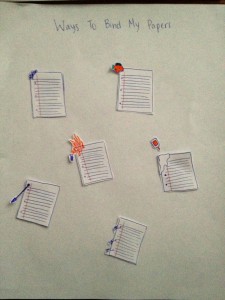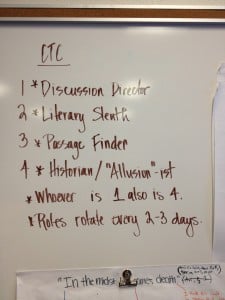Sarah decided to take what I said about papers and take it a few steps further. I had a good laugh over this.
Monthly Archives: March 2012
Fantastic Comment
What is that “thing” that Twain does in the novel? This is one of the very first things we discussed when we read the first chapter. 🙂
CTC – Peace Like A River
CTC Roles. These roles should rotate every 2-3 days so that everyone has a chance at each role.
Discussion Director: facilitates the discussion from the previous evening’s reading; may ask members to provide summaries; use the discussion questions from the novel; keeps track of the daily log.
Techniques & Devices Examiner: locates the literary techniques and rhetorical devices (check google docs) that are particularly noteworthy of a closer investigation, especially the motifs; be sure to go beyond the obvious.
Critical Passages Examiner: locates passages that are worthy of a group discussion and offers insight to the novel or to the writer’s style.
Heroic Quest, Tragedy, Romance: locates those elements associated with these types of storytelling.
CTC Structure:
DD leads the day’s discussion through the summaries, the discussion questions
Literary techniques/Rhetorical devices
Critical Passages
Heroic Quest, Tragedy, Romance
Silent Discussion Big Paper Protocol
Daily Log: Keep track of the following information:
Date
Everyone’s role
Topics discussed
Plan for the next CTC day
Who was unprepared
21 Things That Will Be Obsolete by 2020
By Shelly Blake-Plock
1. DESKS
2. LANGUAGE LABS
3. COMPUTERS
4. HOMEWORK
5. THE ROLE OF STANDARDIZED TESTS IN COLLEGE ADMISSIONS
6. DIFFERENTIATED INSTRUCTION AS A SIGN OF DISTINGUISHED TEACHER
7. FEAR OF WIKIPEDIA
8. PAPERBACKS
9. ATTENDANCE OFFICES
10. LOCKERS
11. I.T. DEPARTMENTS
12. CENTRALIZED INSTITUTIONS
13. ORGANIZATION OF EDUCATIONAL SERVICES BY GRADE
14. EDUCATION SCHOOLS THAT FAIL TO INTEGRATE TECHNOLOGY
15. PAID/OUTSOURCED PROFESSIONAL DEVELOPMENT
16. CURRENT CURRICULAR NORMS
17. PARENT-TEACHER CONFERENCE NIGHT
18. TYPICAL CAFETERIA FOOD
19. OUTSOURCED GRAPHIC DESIGN AND WEB DESIGN
20. HIGH SCHOOL ALGEBRA 1
21. PAPER
Click here to read the full article.
Avi’s Writing Advice
Much of this should sound familiar since you hear me say these things in class ad nauseum.
Six Secrets to Good Writing
1. Read, read, read. Reading is the key to good writing. The more you read, the better the writer you can be. You can never read too much.
2. Write! It’s not written until it’s on the paper. Story telling is a great art, but it is not story writing.
3. Write what you would enjoy reading. You’ll have more fun, and it will be better.
4. Rewrite! No one ever writes anything well the first time. The first draft cannot be the last draft. (I rewrite my work fifty-sixty times—or more). Here’s a tip: read your first draft, and if you think it’s good, you are in trouble. But, if you read it and you see it’s not that good, you are in great shape—to get going. The more you rewrite the better your writing will be.
5. Write for readers. Maybe you understand what you have written, but the writer’s job is to have the reader understand it. Keep in mind: writers don’t write writing, they write reading.
6. Listen. Read your work out loud (pencil in hand) and it will let you hear your own writing. It will almost improve itself.
Avi – City of Orphans Video Contest
Create a video inspired by Avi’s City of Orphans, and you could win an in-person visit from Avi to your classroom or library!
Create your video and then have a teacher or librarian register and upload it for the City of Orphans Video Contest.
Upload your video between March 1st and March 31st. First round of voting is April 7-15, 2012. Top ten finalists will be posted for voting from April 22-30, 2012. Winner will be announced on May 7, 2012.
The Grand Prize is a free in-person visit by Avi to your classroom or library, and lunch with Avi for the videographer and sponsoring teacher or librarian.
Nine finalists will win a one-hour Skype visit from Avi to his or her classroom or library.
Five voters, drawn at random, will receive an autographed copy of City of Orphans.
For Contest updates, “like” Avi’s Author page on Facebook.
Here’s how to enter, voting and prize information as well as helpful resources. Good luck!
For complete information, visit http://www.avi-writer.com/contest/index.html
Listen to Crispin
Listen to Avi read from Crispin: The Cross of Lead:
http://www.avi-writer.com/books/books/crispincross.html
Philosophy Schmolosophy
The Philosophy Pages by Garth Kemerling are licensed under a Creative Commons Attribution-ShareAlike 3.0 Unported License.
Click to access links to the various Philosophy Timelines
Online Stanford Encyclopedia of Philosophy
Crispin – Critical Thinking Circles
I have shared a handful of documents through Google Docs. Your CTC team may choose to use the shared documents or use the one that your team has created. In either case, the work must be thorough and legible. Here are the items related to the Critical Thinking Circles for Crispin.
Crispin Planning Calendar G6
Critical Thinking Circles
Crispin Big Paper Silent Discussion
CTC Daily Log
STAAR Wars Writing
Students, I will be thinking of you all as you tackle your assessments. I know that you will knock the test out of the park!
Grade 7
Revising and Editing: Use your SATs for review.
Narrative: The STAAR Wars packet has the elements that we’ve studied, used, analyzed, applied, etc. Take your narrative and “break it down”. Using the planning sheet (p. 4) and the other analysis handouts (pp. 11-14), check to see that you have the elements of a narrative. You do not have to rewrite your narrative unless you want to as another practice opportunity (pp. 5-6)
Expository: The STAAR Wars Packet has the elements that we’ve studied, used, analyzed, applied, etc. Take your expository and “break it down”. Using the planning sheet (p. 1) and the other analysis handouts (pp. 7-10), check to see that you have the elements of a narrative. You do not have to rewrite your narrative unless you want to as another practice opportunity (pp. 2-3)
Grade 8: Review your TP-CASTT Thinking Chart and AP style MC questions so that you can review the critical reading skills.



